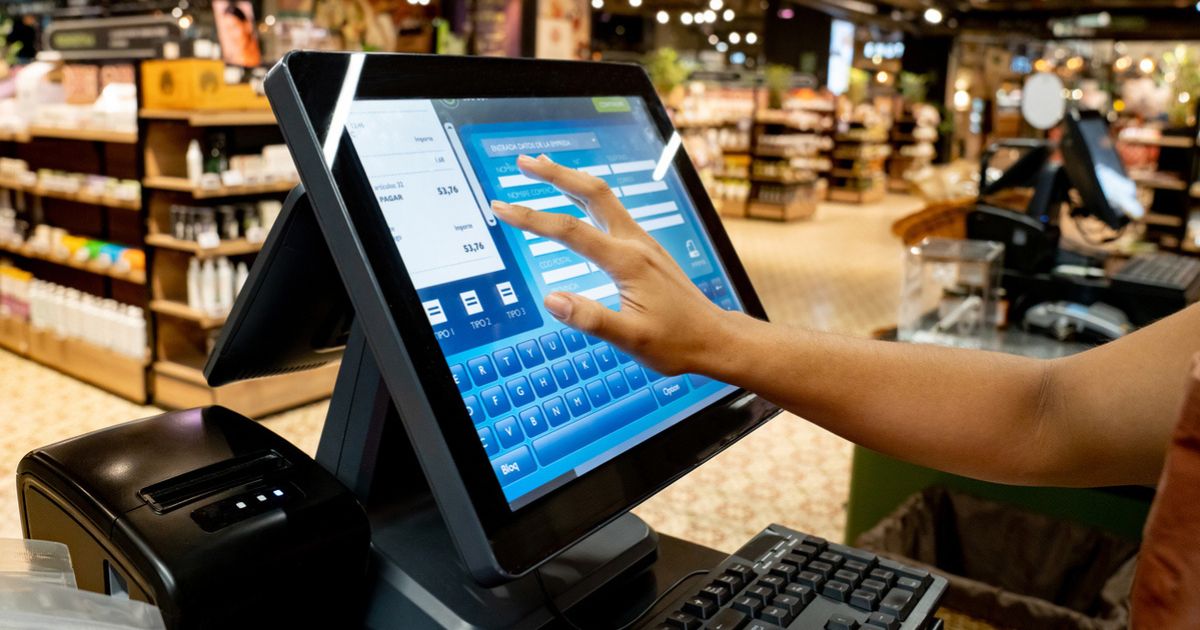
| November 17th, 2023 |
Navigating the Evolution of POS Systems in Payment Processing!
In the realm of commerce, the Point-of-Sale (POS) system serves as the linchpin, orchestrating the final act of a transaction. From the humble cash register to the sleek touchscreen terminals of today, POS systems have come a long way in shaping the retail experience. In this comprehensive exploration, we unravel the layers of POS systems, from their foundational uses to the transformative benefits propelling them into the future.
Understanding the Basics — What is a POS System?
At its core, a Point-of-Sale system is the technological nexus where a customer makes a payment in exchange for goods or services. Traditionally, this involved a cash register and manual entry of transactions. However, modern POS systems encompass a digital ecosystem, including hardware like barcode scanners, receipt printers, and software that integrates inventory management, sales analytics, and customer relationship tools.
Applications of POS Systems — Beyond Transactions:
While the primary function of a POS system is to facilitate transactions, its applications extend far beyond the mere exchange of currency for goods. Modern POS systems play a pivotal role in inventory management, tracking sales trends, and streamlining business operations. Additionally, they enable businesses to gather valuable data on customer preferences and buying behavior, paving the way for targeted marketing strategies.
The Future Unveiled — Trends Shaping Tomorrow’s POS Systems:
1. Contactless Technology — A Touch-Free Tomorrow:
With the global emphasis on hygiene and convenience, contactless payment technology is slated to become the cornerstone of POS systems. NFC (Near Field Communication) and RFID (Radio-Frequency Identification) technologies are paving the way for seamless, secure, and swift transactions without the need for physical contact. Customers can simply tap or wave their cards, smartphones, or wearables, reducing transaction times and enhancing overall efficiency.
- Hygienic and Swift Transactions: NFC and RFID technologies enable touch-free payments, aligning with global hygiene concerns.
- Improved Efficiency: Faster transaction times contribute to reduced queues and enhanced operational efficiency.
2. Mobile POS — Empowering Transactions on the Go:
The rise of mobile POS systems is indicative of a shift towards flexibility and mobility. Businesses are adopting mobile devices such as tablets and smartphones as POS terminals, enabling transactions to happen anywhere within a store or even beyond its physical boundaries. This not only enhances the customer experience by reducing wait times but also empowers businesses with the agility to adapt to changing operational needs.
- Flexibility and Mobility: Businesses leverage mobile devices as POS terminals, enabling transactions on the shop floor or remotely.
- Adaptability: Mobile POS facilitates quick setup and scalability, ideal for businesses with changing spatial or operational needs.
3. Integration of AI and Machine Learning — Smarter Transactions:
The incorporation of Artificial Intelligence (AI) and Machine Learning (ML) algorithms into POS systems is set to revolutionize the way transactions are processed. Predictive analytics will enable businesses to anticipate customer preferences, optimize inventory management, and personalize the shopping experience. Moreover, fraud detection systems powered by AI will add an extra layer of security, safeguarding both businesses and consumers from potential threats.
- Personalization: AI algorithms analyze customer behavior, offering personalized recommendations and enhancing the shopping experience.
- Fraud Detection: Machine learning enhances security measures, identifying and preventing potential fraud in real-time.
4. Blockchain — Enhancing Security and Transparency:
Blockchain technology is making significant inroads into POS systems, promising enhanced security and transparency in payment processing. By providing a decentralized and immutable ledger, blockchain ensures that transactions are secure, traceable, and resistant to tampering. This not only reduces the risk of fraud but also instills greater confidence in consumers, fostering trust in the payment process.
- Security and Transparency: Blockchain ensures secure, transparent, and tamper-resistant transactions, fostering trust among consumers.
- Immutable Record Keeping: A decentralized ledger reduces the risk of data manipulation, enhancing the integrity of transaction records.
5. Subscription-Based POS Services — Shaping Cost Efficiency:
The future of POS systems also sees a shift towards subscription-based services, allowing businesses to access advanced features without the need for significant upfront investments. This model not only makes cutting-edge POS technology more accessible to small and medium-sized enterprises but also ensures that businesses can scale their operations in a cost-effective manner.
- Cost Efficiency: Subscription models make advanced POS technology accessible, particularly for small and medium-sized enterprises.
- Scalability: Businesses can scale their POS capabilities without substantial upfront investments.
6. Enhanced Data Analytics — Unveiling Consumer Insights:
Data is increasingly becoming a valuable asset, and POS systems of the future are poised to capitalize on this. Advanced data analytics tools integrated into POS systems will provide businesses with valuable insights into consumer behavior, preferences, and purchasing patterns. Armed with this knowledge, businesses can tailor their strategies to meet the evolving needs of their customer base.
- Deeper Insights: Advanced analytics tools unveil nuanced customer insights, enabling businesses to refine their strategies.
- Tailored Marketing: Data-driven marketing strategies based on customer behavior contribute to increased engagement and loyalty.
7. Eco-Friendly Solutions — Sustainable Transactions:
As environmental awareness takes center stage, POS systems are expected to embrace eco-friendly solutions. From paperless receipts to energy-efficient hardware, the future of POS systems will prioritize sustainability, aligning with the growing demand for environmentally responsible business practices.
- Paperless Transactions: POS systems embrace eco-friendly practices, such as digital receipts, contributing to environmental sustainability.
- Energy-Efficient Hardware: The future sees a focus on energy-efficient POS hardware, reducing the carbon footprint of transaction processing.
Benefits of Modern POS Systems — A Multifaceted Advantage:
1. Efficiency and Accuracy:
- Streamlined Transactions: POS systems eliminate the need for manual calculations, reducing the likelihood of errors and expediting the checkout process.
- Inventory Management: Automated tracking prevents stockouts and overstock situations, optimizing the supply chain.
2. Enhanced Customer Experience:
- Quick and Convenient Transactions: Fast and secure payment options, including contactless technology, improve the overall shopping experience.
- Personalized Service: Access to customer data enables businesses to tailor offerings, promotions, and loyalty programs.
3. Real-time Data Insights:
- Informed Decision-Making: POS analytics provide real-time data on sales trends, allowing businesses to make data-driven decisions.
- Forecasting and Planning: Predictive analytics help businesses anticipate demand, reducing wastage and optimizing inventory levels.
4. Security and Compliance:
- Fraud Prevention: Advanced security features, including encryption and tokenization, protect both businesses and consumers from fraudulent activities.
- Regulatory Compliance: POS systems assist in adhering to industry regulations and data protection standards.
Conclusion — Embracing the Evolution:
As we traverse the trajectory of POS systems, from their fundamental role in transactions to the futuristic innovations shaping their landscape, it becomes evident that the evolution is not merely about technological advancements. It’s about crafting a seamless, secure, and personalized experience for both businesses and consumers. The future of POS systems holds the promise of transforming transactions into interactive, intelligent, and sustainable engagements. As businesses embrace these changes, they not only future-proof their operations but also contribute to the evolution of commerce itself. Step into the future of transactions, where innovation meets interaction, and commerce evolves.
